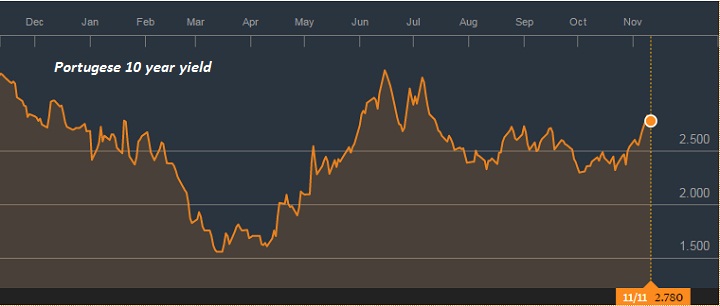Newly formed center-right minority government in Portugal has fallen, after a decisive parliamentary vote and now a socialist government, supported by leftist faction of the parliament is set to form government. Portugal's president, Anibal Cavaco Silva will ask, António Costa, the Socialist party leader, to form government.
There lies the problem, this government is against austerity, which risks bringing Portugal to similar position like Greece. Only thing is that Greek's debt burden and loan issued was much greater in size.
To add further, this government will be a coalition of a socialist party, majority of whose ideas were close to fallen government and there are significant differences of ideas between the socialist and the leftist. So stability of the government also remains a key issue.
So far market hasn't taken much note of it, especially Euro, which is more focused on policy divergence at the moment. However, rising borrowing cost of Portugal is flashing alarms already.
10 year Portuguese sovereign bond is hovering around 2.8%, a level not seen since July.
So far the leftists have dropped their demand for exit from Euro area and upfront debt restructuring of Portugal's debt and joined the socialist government, but many analysts believe it is only a matter of time before government is held hostage by fresh demands.



 JPMorgan Lifts Gold Price Forecast to $6,300 by End-2026 on Strong Central Bank and Investor Demand
JPMorgan Lifts Gold Price Forecast to $6,300 by End-2026 on Strong Central Bank and Investor Demand  Nasdaq Proposes Fast-Track Rule to Accelerate Index Inclusion for Major New Listings
Nasdaq Proposes Fast-Track Rule to Accelerate Index Inclusion for Major New Listings  FxWirePro- Major Crypto levels and bias summary
FxWirePro- Major Crypto levels and bias summary  Elon Musk’s Empire: SpaceX, Tesla, and xAI Merger Talks Spark Investor Debate
Elon Musk’s Empire: SpaceX, Tesla, and xAI Merger Talks Spark Investor Debate 































